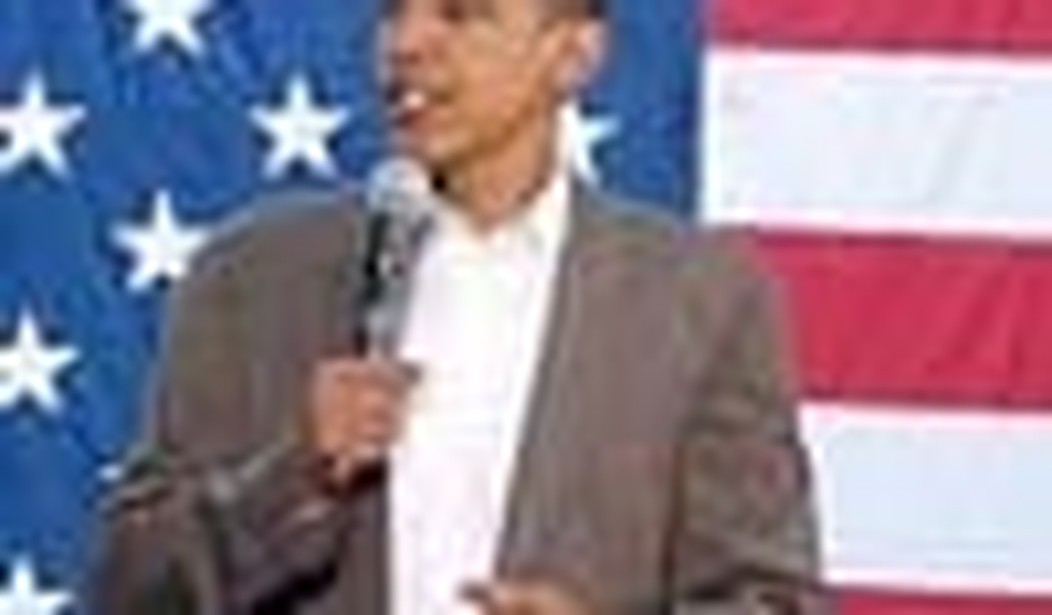Barack Obama came to town on Monday, bringing 11,000 people into the arena of Wright State University and snarling traffic near my apartment. Dayton, Ohio, has seen a lot of the Clintons lately; I am hard pressed to think of a copy of the Dayton Daily News I’ve read in the past two weeks that didn’t give five column inches or so on the front page to an appearance Hillary, Bill, or Chelsea made or intended to make. But Obama managed to capture the three center columns of the DDN’s front in their entirety with his rally. The headline? “Obama says he’ll push to improve job scene.” And under the photo: “Democratic presidential hopeful addresses Ohio’s lost jobs, Clinton’s comments on his NAFTA position.”
Ohio wants jobs, and it’s not sure where to get them. Politicians everywhere love to advertise job creation as a feature of new programs, but Ohio seems especially credulous toward these claims. The governor’s initiative to issue $1.7 billion in state bonds to fund an omnibus bill for green subsidies, infrastructure maintenance, higher education, medical research, and pollution abatement — among other things — appears to contravene a clause of the Ohio constitution prohibiting government ownership of corporate shares. But billed as the Building Ohio Jobs plan, the plan is also to create 80,000 jobs. I will be surprised if it does not pass.
Given the Ohio economic psyche, then, it was shrewd of Barack Obama to position himself as the anti-NAFTA candidate in his Virginia victory speech, just as Ohio at large started to pay close attention. Foreign trade is not the main driver of job loss in the Rust Belt; technological improvements make it possible to make more products with less labor than ever before, and the invention of interstate highways and air conditioning make it practical to build factories away from northern lakes, rivers and canals.
Nevertheless, in Virginia Obama lambasted “trade deals like NAFTA [that] ship jobs overseas and force parents to compete with their teenagers to work for minimum wage at Wal-Mart.” The next week, “In the last year alone, 93 plants have closed in Ohio… And yet, year after year, politicians in Washington sign trade agreements that are riddled with perks for big corporations but have absolutely no protections for American workers.” The week after that, Obama conceded that NAFTA’s repeal was not “realistic,” cited a 2004 remark of Clinton’s praising NAFTA as good “on balance,” then declared, “One million jobs have been lost because of NAFTA, including nearly 50,000 jobs here in Ohio. And yet, 10 years after NAFTA passed, Sen. Clinton said it was good for America. Well, I don’t think NAFTA has been good for America — and I never have.”
It’s pandering, but what gorgeously strategic pandering. Either Hillary Clinton distances herself from Bill Clinton’s achievements — undermining her claims of experience as First Lady — or she embraces a treaty that is still unpopular with blue-collar Democrats, her base. Clinton was associated with an economic boom her husband didn’t cause; now she is associated with a trade agreement he didn’t negotiate. Next week, she will lose the primary here.
Obama has proposed a muddle of reforms to induce corporations to site jobs in the USA, which if implemented would require a complicated new regulatory body (bad), prompt more international holding company reorganization than actual job-motion (neutral) and eviscerate the USA’s tottering corporate tax system (probably good). If the electorate holds him to his promises, President Obama might pass a really weird bill come 2009, frittering away his post-partisan economic cred. It might resemble the time in 2002 the current, pro-business president passed an embarrassing tariff on steel imports, only to be slapped down by the WTO.
That’s okay. Undemocratic institutions make good whipping boys for policies democracies can’t enact on their own. Low tariffs, open markets, and peace are good for almost everybody; but someone always stands to gain by convincing the electorate it isn’t so. Elected officials can pass bad protectionist laws, then blame the World Trade Organization when they retract them, providing all the political capital of protectionism without the economic havoc of actually having it. Central banks are only effective in countries where they are politically independent. The United Nations absorbs saber-rattling so well because it’s a bureaucratic tar pit; were it less dysfunctional, it wouldn’t dampen international relations nearly so well.
I therefore suspect Obama is proposing actions he knows he will be prevented from taking. Furthermore, I doubt he believes in his proposals’ wisdom. Obama has a professional association with many of the nation’s foremost economists at the University of Chicago; many are his advisers; none would call his trade proposals a good idea. This is a risk. Obama has an image that is not just post-racial and post-partisan; it’s post-bullshit. Yet he can’t possibly think his plan is feasible or smart.
Sadly, though Obama’s other economic proposals are excellent, even visionary, it is this foray into folk economics that has gotten him a lot of press, because it’s what his target audience wants to hear: three columns wide on the front page of the Dayton Daily News, NAFTA Is Bad. But it’s hard for me to blame the candidate or the state. Ohio just wants a job; that’s what Barack Obama wants, too.
Nic Duquette is a writer living in Ohio. He previously worked for the FED in Boston.









Join the conversation as a VIP Member